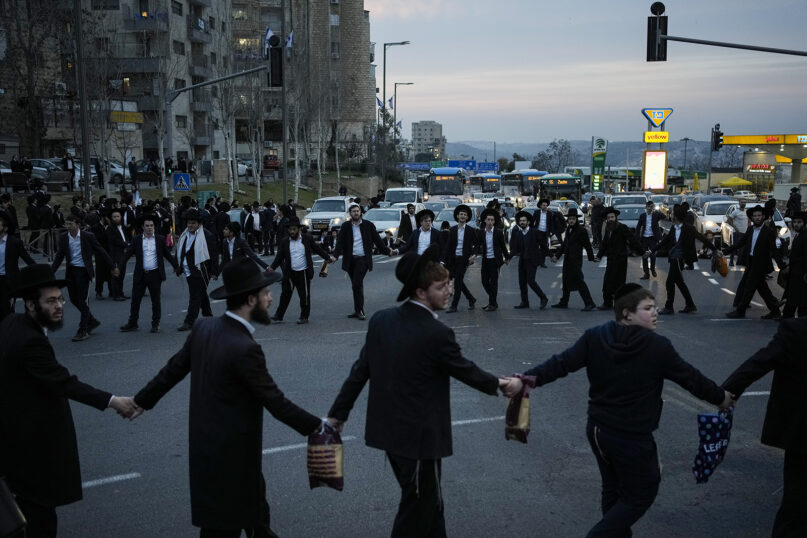(RNS) — It’s a perennial but repeatedly back-burnered issue in Israel: Should haredim (often called “ultra-Orthodox Jews”) who are studying religious texts full time be conscripted into military service?
For obvious reasons, the question has come to the fore again. In the weeks after Hamas attacked southern Israel on Oct. 7, the desire to defend their country militarily overrode for many the exemption Haredi Jews are given from the mandatory military stints served by other Israelis, men and women. By the end of October it was estimated that some 2,000 Haredi men had volunteered for the Israeli Defense Forces.
The exemption, long a sore point between religious and secular Israelis, dates to the state’s founding in 1948. But back in 1998, Israel’s High Court of Justice ruled that exempting Haredi students violated the legal principle of equality — here, the “equality of burden” regarding military service. Two decades of legislative attempts to resolve the issue have yielded only more court challenges and kicking of the controversial can down the road.
The sore was newly aggravated last month when a plan was put forth to remedy troop shortages caused by casualties in Gaza and threats from Hezbollah from Lebanon by extending mandatory and reserve duties for current soldiers. Conscripting Haredim was not part of the proposal.
Passing legislation enshrining the Haredi exemption or ending it has political ramifications: Prime Minister Benjamin Netanyahu’s long reign in that post has often depended on Haredi political parties, which oppose conscription, to support his governing majority. The current wartime coalition is no less reliant on Haredi support.
The rationale for conscripting Haredim is self-evident. Why should one segment of the population not share in the burden of military service? Why should its members be out of harm’s way when other segments of society are fighting on dangerous fronts?
Haredim understand that. Even as they insist that the exemption remain in place, they are not callous to the arguments against it. A recent report showed that as many as 30% of Haredim said they agreed that they should be subject to the draft.
There are counterarguments, of course, some more compelling than others.
Other groups — like Arab citizens and conscientious objectors — are also exempted from the Israeli draft. And danger isn’t something faced only by soldiers, as has been evident in the countless terrorist attacks on Israeli civilians, including the massive one of Oct. 7. And there are many vital military personnel, such as intelligence analysts and drone operators, who work in safe and secure environments.
But the most salient factors are simply not fully understood.
First is the threat to their religious way of life that Haredim see in entering military service. As political analyst Shmuel Rosner, no fan of Haredim, recently wrote: “I always thought that there is something dishonest in trying to claim that ultra-Orthodox can enlist in the IDF without the slightest risk to their identity as ultra-Orthodox.”
Many in Israel, of course, may not care if Haredim are able to protect their way of life, but disregarding their fears here is a decidedly illiberal stance.
The second factor that demands attention, even if not agreement, is the most germane: From a Jewish religious perspective, a force of men immersed in Torah study contributes to Israeli national security, and is indeed essential to it.
This is an ancient idea in Jewish faith. A well-known ancient Jewish source explains that, during a particular war in biblical times, 3,000 men were drafted from each tribe: 1,000 for combat, 1,000 for logistic support and 1,000 for Torah study and prayer.
A full third of eligible soldiers thus occupied spiritual units considered no less important for the war effort than logistic and combat units. That dovetails with the Talmud’s observation that “If it weren’t for David’s Torah study, Joab (the commander of King David’s army) would not have succeeded in war; and if not for Joab’s effort in battle, David would not have been able to study Torah.”
According to the medieval Jewish luminary Maimonides, the entire tribe of Levi was exempt from combat duty, and he concludes that anyone who dedicates himself to a life of Torah study is included in this category.
By forming a cadre of men studying Torah, these dedicated students sincerely, utterly and deeply believe that their work is essential to the safety and security of all their fellow citizens.
Obviously, citations from ancient Jewish sources will not impress many moderns, but for Haredim (and many non-Haredi believing Jews), they represent not a myth but a reality. It is important to view the Haredi refusal to go into combat as a question of religious liberty. Rather than being dismissed as some creative bit of draft dodging, it is, rather, a declaration of deep, sincere belief backed by the Jewish religious tradition.
So all the angst and anger born of the haredi insistence on preserving a sizable cadre of men engaged in full-time dedication to Torah study needs to be tempered by an acknowledgment that, at least in haredi eyes, those dedicated students are not evading public service but contributing to it — and in a way that, they sincerely, utterly and deeply believe, is essential to the safety and security of all their fellow citizens.
(Rabbi Avi Shafran writes widely in Jewish and general media and blogs at rabbishafran.com. The views expressed in this commentary do not necessarily reflect those of Religion News Service.)





